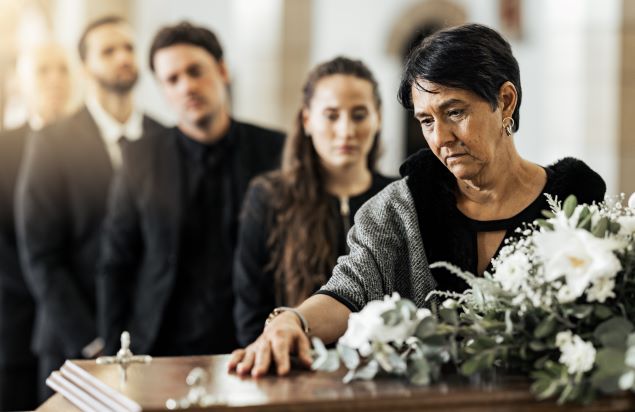Looking after yourself after a loved one dies
When coping after a loved one dies, it is important to remember to look after yourself. Grief can be a difficult and complex emotion to process. It’s normal to experience a wide range of emotions from sadness and anger to guilt and in certain circumstances, even relief.
You need to make sure to take time to look after yourself during this difficult time. There are ways to help you cope and finding the best coping strategy that works for you can assist in managing these feelings. Many people grieve differently, and what works for one person may not work for another.
Here are our tips for looking after yourself after the loss of a loved one:
Time
Give yourself time, there are no rules or timelines when it comes to grieving. Each person deals with grief in their own time and way. Allow yourself to feel sadness and don’t try to do too much you don’t need to until you are ready to do so.
A loss of a loved one can also result in other losses, such as loss of a home and/or income. Allow yourself to grieve for all these losses and be patient with your grief.
Talk
Talking about your feelings, thoughts and memories of the person who died can help yourself and others. You might want to talk to a friend or relative, or to a GP, bereavement counsellor or helpline. You may find that some people avoid talking to you about your loss. This is usually to avoid upsetting you and because they don’t know what to say. However, others may be very open and easily talk to you about your loss, and talking to these people about how you feel, and sharing your stories about your loved one can all help.
Daily life
When coping with grief it is important to have some structure to your day and incorporate small things to help you to feel better. Even if you do less than normal, it is okay. Things to try and do daily include:
- Getting enough sleep. This can be difficult, but understand that that is important and try to have a bedtime routine to avoid sleep issues. Avoid stimulants, like coffee, tea and caffeinated soft drinks to reduce sleeping issues.
- Healthy eating. Often not eating as much or eating more is a common result of grief. Try not to be hard on yourself if your appetite and diet is affected by grief, in time it will return to normal.
- Doing some exercise during the day may help with sleeping better at night and also help to boost your mood. Try going for a walk or doing some gentle exercise, like yoga or pilates.
- Be kind to yourself and don’t put pressure on yourself.
- Avoid substances that act as distractions, such as excessive alcohol. Alcohol is a depressant so if you are struggling with your mood and emotions, it can make things worse rather than better.
- Other small things that may help you on a daily basis include:
-
- leaving the house, even if it’s just to go for a walk,
- doing something creative, like colouring or drawing,
- spending time with a pet or animal,
- being in nature,
- meditation or breathing exercises.
Help
It’s a good idea to accept offers of help from your friends and family when they offer. Often people want to help but are not sure how. If they don’t know how to assist, suggest to them what kind of help would be most useful.
There are often many practical things you need to do after a loved one dies and you may be the person responsible for these things. Ask for help to get through these things, such as contacting people and organisations and planning the funeral. Here is a simple contact list that may help you or someone you know to get some of these practical things done – Checklist on who to notify.
Writing
Writing down your thoughts and feelings can be very cathartic. When you don’t have anyone to listen, why not write it all out in a journal. Recording your thoughts and feelings in a journal can help you come to terms with your grief and loss and can be an important step in coping with the death of a loved one.
Crying
Crying is a normal reaction to someone’s death and can be an important part of the grieving process – the body’s way to reduce stress and soothe itself. If you feel like crying, try not to question it, most people feel better afterwards.
It is also OK if you do not feel like crying, some people might feel numb – everyone experiences grief differently.
Memories
Part of the grieving process is about keeping your memories of your loved one alive. This can be done by sharing stories with family and friends, or by honouring plans that you had together. It may also be helpful to create a routine or some sort of memorial act. This could include planting a new plant or flower in their honour, regularly visiting a special place to them or celebrating the person with family and friends on birthdays or anniversaries.
Reaching out
When you are ready, reach out to your social networks. Start to see friends again or even try to make new friends. Keeping socially connected will help you through the grieving process, help establish new routines and avoid loneliness. Start making plans, returning phone calls, and booking up your social calendar so you have things to look forward to and people to connect with.
Support
You don’t have to cope on your own. If you are struggling to cope or need someone to talk to, there are several places (other than family and friends) to go for the support and advice you may need. There are various places you can turn too, such as the following:
- Grief Australia has many resources and support services – grief.org.au or 1800 642 066.
- Griefline, a government grief support service, also has many resources, phone and online support and support groups – griefline.org.au or 1300 845 745.
- Talk to your GP, who may be able to help you themselves and/or refer you to a specialist.
- There are also many confidential counselling services that are available online or over the phone 24 hours a day, 7 days a week, including:
- Lifeline Australia on 131 114 or visit the Lifelinewebsite
- Beyond Blue on 1300 22 4636 or visit the Beyond Bluewebsite
- call MensLine Australia on 1300 789 978 or visit the MensLine
No matter what coping strategies you choose, it is important to remember that grief takes time – so be gentle with yourself during this process as you come to terms with your loss. With time, coping with the loss can become possible and eventually bring peace.
In early stages you may find it difficult to make decisions, chat about ordinary things or cope with social gatherings. But don’t give up. Keep trying coping strategies that can help you through your loss and time of grief.
Sources:
www.dementia.org.au/planning-ahead/their-plans/end-of-life/caring-for-yourself-when-a-loved-one-dies
www.mariecurie.org.uk/help/support/bereaved-family-friends/dealing-grief/looking-after-yourself











